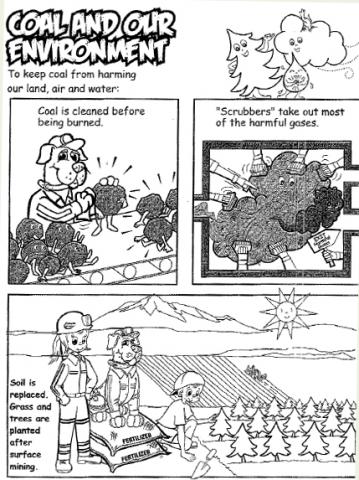Get ‘em while their young!
It’s a widely know fact that children, whose immune systems are weaker than adults and still developing, are especially susceptible to getting sick from the chemicals and toxins found in fossil fuel pollution. They are also susceptible to another kind of fossil fuel pollution: educational propaganda.
Scientists have even discovered that brains don’t fully develop and mature until the age of 25. That’s why kids continually shove unidentified objects up their nose, light random things on fire, eat worms, and think licking the light socket might be the best ideas of their short-lived little lives. It’s also why they won’t be able to tell the difference between well-rounded educational materials and industry propaganda.
That’s also why it’s disturbing to see the array of news reports showcasing coloring books, cartoons, and lovable characters that the fossil fuel industry has come up with to entice little tykes. This isn’t your run-of-the-mill energy education. The reason these materials are so exploitative is because none of them explore any of the pitfalls of dirty energy. There’s nothing about public health concerns, water pollution, or the decimation of local ecosystems. And there’s definitely nothing about climate change, which surely belongs on the top 10 list of things kids should be peeing their pants about (after the closet monster of course).
Here’s a litany of examples:
A few days ago, we reported on a natural gas company’s new mascot, Talisman Terry the Fracosaurus and the coloring book Talisman Energy has released without explaining to kids that Talisman Terry would probably be losing his scales if he drank the water contaminated by the process of hydraulic fracturing (fracking).
Chesapeake Energy, another gas company, came up with Chesapeake Charlie, the beagle who loves natural gas, who also has his own coloring book.
In May, Scholastic Inc. cancelled the distribution of a fourth-grade educational package entitled “United States of Energy” that was contracted by the American Coal Foundation. They ended up dropping the client because of outrage from the community over one-sided learning materials that conveniently left out the negative impacts that coal has on the environment and human health.
Also in May, a group released a parody website, Coal Cares, that satirized coal pollution’s link to childhood asthma. The website offered novelty inhalers to children within 200 miles of a coal plant. But fiction turned out to be not far from the truth.
It turns out that the coal industry has been creating children’s material for years, even some eerily similar to the farcical Coal Cares website. For example, the pro-coal group, Friends of Coal, put out a “Let’s Learn About Coal” coloring book two years ago.
The American Coalition for Clean Coal Electricity put out a website cartoon with singing lumps of coal for Christmas a couple years ago. The outrageous part is that if the coal industry were to do something like market a “coal ash sandbox” as a new environmental initiative to “recycle” the toxic byproducts of coal combustion, the public has been so desensitized to these type of tactics that it’s probably not out of the realm of possibility.
Even the biomass industry is trying to tap into this resource with their own coloring book. Burning biomass for energy is a process that’s only 24% efficient, which is even less than other fossil fuels. Not to mention it takes trees, which help fix that burgeoning carbon problem the world is having, and burns them, which ends up releasing more carbon dioxide into the atmosphere instead of taking it out.
It’s likely that these dirty industries are taking a page out of Big Tobacco’s play book. The tobacco industry has been under fire for decades for trying to get youth addicted to cigarettes. The younger kids start to smoke, that ultimately turns into more profits for the companies per lifetime. Joe Camel is the most familiar, and although the companies at present claim they don’t target youth anymore, insider reports show otherwise.
While oil, coal, and gas don’t have a particular chemical like nicotine that is addictive, the American affinity for fossil fuels has often been compared to being a dangerous addiction the US doesn’t seem to want to go to rehab for.
It seems like the only thing that could be worse would be coloring book propaganda from the Tea Party for kids. Oh wait, there already is one.
Subscribe to our newsletter
Stay up to date with DeSmog news and alerts







